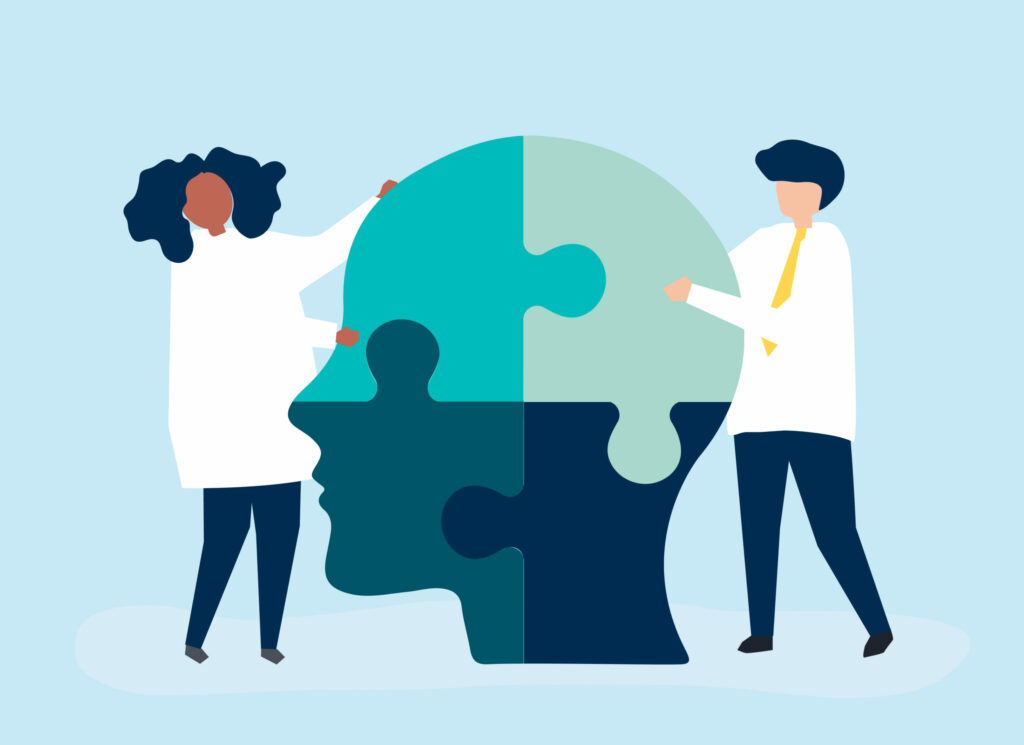Mental health professionals help people deal with mental health issues. They offer counseling and therapy to people who need it. There are many different types of mental health professionals, including psychiatrists, psychologists, social workers, and therapists. Each type of professional offers a unique set of services. In this blog post, we will discuss the roles and responsibilities of mental health professionals. We will also talk about the training that is required to become a mental health professional.
Contents
- 1 Who Are Mental Health Professionals?
- 2 Different Types of Mental Health Professional
- 3 Reasons For Visiting Mental Health Professionals
- 4 Questions You Can Ask Your While Visiting Mental Health Professional
- 5 Benefits of Visiting Mental Health Professional
- 6 Tips To Keep Mind While Visiting Mental Health Professional
- 7 Conclusion
- 8 A Word From Therapy Mantra
Who Are Mental Health Professionals?
 Mental health professionals are people who have gone to school and studied psychology, psychiatry, or social work. They are able to help people deal with their mental health issues by providing counseling, therapy, and medication if necessary. Mental health professionals can work in a variety of settings, including hospitals, clinics, schools, and private practice.
Mental health professionals are people who have gone to school and studied psychology, psychiatry, or social work. They are able to help people deal with their mental health issues by providing counseling, therapy, and medication if necessary. Mental health professionals can work in a variety of settings, including hospitals, clinics, schools, and private practice.
These are also the people who are able to diagnose mental health conditions and provide treatment plans.
Mental health professionals can be a great resource for people who are struggling with their mental health. If you are feeling overwhelmed or just need someone to talk to, reach out to a mental health professional in your area. They will be more than happy to help. There are also many online resources available if you are not able to see a mental health professional in person.
Different Types of Mental Health Professional

There are many different types of mental health professionals such as:
Psychologists
Psychologists are someone who has completed a doctoral degree in psychology. They are licensed to diagnose and treat mental, emotional, and behavioral disorders. There are psychologists who specialize in areas such as pediatric psychology, geropsychology, sports psychology, and more. There are people who only see psychologists for counseling, and there are also people who take medication from psychologists. Sometimes people see a psychologist in conjunction with a psychiatrist. These are also the people who are able to do testing such as intelligence tests, personality tests, and achievement tests.
Psychiatrists
Psychiatrists are medical doctors who have completed a residency in psychiatry. They are able to diagnose and treat mental health conditions using medication and therapy. Psychiatrists can also order lab tests and imaging studies if necessary. Some psychiatrists also specialize in a certain area of psychiatry, such as addiction psychiatry or forensic psychiatry. There are some people who only see a psychiatrist for medication, and there are also people who see a psychiatrist for therapy as well. Sometimes, people see a psychiatrist in conjunction with a psychologist. It can also be helpful to see a psychiatrist if you are having trouble with your medication.
Social Workers
Social workers are people who have gone to school and studied social work. They are able to help people with their mental health by providing counseling, therapy, and advocacy. Social workers can work in a variety of settings, such as hospitals, clinics, schools, and private practice. Some social workers also specialize in a certain area, such as child welfare or geriatrics. There are many different types of social workers, so it is important to find one that specializes in the area that you need help with. There are social workers who only see people for counseling, and there are also social workers who provide case management services.
Therapists
Therapists are someone who provides counseling services to people who are struggling with their mental health. Therapists can work in a variety of settings, such as hospitals, clinics, schools, and private practice. There are many different types of therapists, so it is important to find one that specializes in the area that you need help with. Some therapists only see people for counseling, and there are also therapists who provide therapy services. There are many different types of therapy, such as cognitive-behavioral therapy, psychoanalysis, and more. It is important to find a therapist that you feel comfortable with and one that uses the type of therapy that you are interested in.
Counselors
Counselors are someone who provides counseling services to people who are struggling with their mental health. Counselors can work in a variety of settings, such as hospitals, clinics, schools, and private practice. There are many different types of counselors, so it is important to find one that specializes in the area that you need help with. Some counselors only see people for counseling, and there are also counselors who provide therapy services. It is also important to find a counselor that you feel comfortable with and one that uses the type of counseling that you are interested in.
Clinicals
Clinicals are people who work in a mental health setting, such as a hospital, clinic, or private practice. Clinicals can be either psychiatrist, psychologists, social workers, counselors, or therapists. Clinicals are able to provide counseling services to people who are struggling with their mental health. Clinicals can also work in a variety of settings, such as hospitals, clinics, schools, and private practice. It is important to find a clinical that you feel comfortable with and one that specializes in the area that you need help with. There are also clinics that provide therapy services.
Primary Care Physicians
Primary care physicians are people who have gone to school and studied medicine. They are able to diagnose and treat mental health conditions using medication and therapy. Some primary care physicians also specialize in a certain area of psychiatry, such as addiction psychiatry or forensic psychiatry. There are some people who only see a primary care physician for medication, and there are also people who see a primary care physician for therapy as well. Sometimes, people see a primary care physician in conjunction with a psychiatrist. It can also be helpful to see a primary care physician if you are having trouble with your medication.
Reasons For Visiting Mental Health Professionals

The are many reasons why people might visit mental health professionals. Some of these are:
Mental Illness
Mental Illness can be one reason why people might visit mental health professionals. Mental illness is a condition that causes changes in thinking, mood, and/or behavior. It can be mild or severe and can affect a person’s ability to function at work, school, or home. There are many different types of mental illness, such as anxiety disorders, mood disorders, schizophrenia, and eating disorders. There can be many different reasons why someone might develop a mental illness, such as genetics, environment, or stress. If you think you might have a mental illness, it is important to see a mental health professional so that you can get the help you need.
Stress
Stress can also be a reason why people might visit mental health professionals. Stress is a normal part of life and can come from work, family, school, or other things. However, too much stress can be bad for your health. It can make it hard to concentrate, sleep, eat well, and enjoy life. If you are feeling overwhelmed by stress, it is important to talk to a mental health professional so that they can help you manage it. It can also help to learn some stress management techniques, such as relaxation techniques or exercise.
Grief
Grief is another reason why people might visit mental health professionals. Grief is a normal reaction to loss, such as the death of a loved one, the end of a relationship, or a job loss. It can be very difficult to deal with grief and it can make you feel overwhelmed, sad, angry, and confused. If you are having difficulty dealing with grief, it is important to talk to a mental health professional so that they can help you cope with your loss. There are also some helpful books and articles about grief that can be found online or at your local library.
Questions You Can Ask Your While Visiting Mental Health Professional

There are many questions that you can ask your mental health professional. Some of these questions may include:
-What is your educational background in psychology or psychiatry?
-Are you licensed to provide mental health services in our state?
-Do you have experience working with people who have my diagnosis/condition?
-Have you ever been diagnosed with a mental illness? If so, what was it and how did you treat it?
-How do you typically work with clients? For example, do you prefer short or long-term therapy? In-person or over the phone/internet? etc.
-What are your fees and do they vary depending on insurance coverage?
-What are your policies on cancellations, missed appointments, and refunds?
-What are your thoughts on medication? Do you recommend it, have experience prescribing it, or prefer to work with clients who are not taking medication?
-Do you have any experience with (insert treatment modality here)?
-What are your thoughts on (insert sensitive topic here)?
-Is there anything else I should know about you or your practice?
These questions can help you get a better understanding of the mental health professional and their practice. It is important to ask these questions so that you can find a therapist that is a good fit for you and your needs
Benefits of Visiting Mental Health Professional

There are many benefits of visiting a mental health professional. Some people may feel more comfortable talking to a therapist about their problems than family or friends. Others may find that therapy can help them understand and work through their issues.
Some benefits of visiting a mental health professional include:
Improves Mental Health
A mental health professional can help improve mental health. They can provide therapy, medication, or both to help people struggling with mental illness. They can also help you to provide coping mechanisms for dealing with mental health problems.
Prevents Mental Illness
Visiting a mental health professional can also help prevent mental illness from developing. People who visit a therapist on a regular basis are less likely to develop mental health problems than those who do not.
Helps Manage Emotions
Therapy can help people manage their emotions better. When people learn how to deal with their emotions in a healthy way, they are less likely to act out or become overwhelmed by them. This can be helpful for both adults and children.
Improves Relationship Skills
Mental health professionals can also help improve relationship skills. They often work with couples or families to help them resolve conflicts and improve communication. This can be beneficial for both personal and professional relationships.
If you are considering visiting a mental health professional, there are many resources available to help you find one that is right for you. You can ask your doctor for a referral, or look for a therapist in your area online or on the yellow pages. You can also contact your insurance company to see if they have any recommendations. Once you have found a few therapists that you are interested in, it is important to interview them to make sure that they are a good fit for you.
Tips To Keep Mind While Visiting Mental Health Professional

There are many tips that you can keep in mind while visiting a mental health professional. Some of these are:
Be Honest
You should always try to be honest about yourself to your mental health professional. This will help them understand you better and provide you with the best possible treatment. It may have an initial shock for your mental health professional but it is better to be truthful. There are always OEM confidentiality agreements in place so you do not have to worry about anything being revealed to others.
Be Open-Minded
It is also important that you are open-minded when visiting a mental health professional. This means that you should be willing to try different treatments and therapies. If you are not willing to try something then it will be difficult for your mental health professional to help you. They may even suggest trying new treatments if they feel that the current treatment plan is not working for you. There are always new treatments being developed and your mental health professional will be able to tell you about these.
Take Notes
You should also take notes while visiting a mental health professional. This will help you remember what was discussed during the session. It will also help you to track your progress over time. You can even share these notes with your family or friends if you feel comfortable doing so. Sometimes it can be helpful to have someone else read your notes and give you their feedback.
Follow Up
It is important that you follow up with your mental health professional after each session. This will allow them to see how you are progressing and make any necessary changes to the treatment plan. It is also a good way to stay motivated and on track. You may even want to schedule regular appointments so that you can keep up with your progress. These are just a few tips that you can keep in mind while visiting a mental health professional. If you follow these tips then you will be sure to have a successful visit. Visit today and start on the road to recovery. You can also visit our website for more information on mental health professionals and the services that they offer.
Try To Keep In Mind What You Want To Know
You should always try to keep in mind what you should like to know while visiting a mental health professional. This will help you get the most out of your visit. You may want to ask about the different types of treatments that are available, the success rates of these treatments, and how long it will take to see results. You should also ask about the side effects of these treatments. This way you can make an informed decision about whether or not to pursue treatment. You can also ask your mental health professional any questions that you may have. This is a great way to get more information and to feel comfortable with the treatment plan.
Give Authority To Them
You should always try to give authority to someone who is trying to help you. This means that you should trust your mental health professional and follow their advice. If you do not trust them then it will be difficult for them to help you. You may even want to consider finding a new mental health professional if you do not feel comfortable with the current one. Trust is an important factor in any relationship and it is especially important when dealing with mental health issues.
Conclusion
Mental health professionals are important members of the healthcare team. They provide essential services to patients with mental illnesses. Without these professionals, many people would not be able to get the help they need. If you or someone you know is struggling with a mental health issue, don’t hesitate to seek out a mental health professional for help. There are many different types of mental health professionals, so it’s important to find one that’s right for you. A good place to start is by talking to your primary care physician about referrals. You can also contact us for mental health services. We can help you find the right mental health professional for your needs.
A Word From Therapy Mantra
Your mental health — Your psychological, emotional, and social well-being — has an impact on every aspect of your life. Positive mental health essentially allows you to effectively deal with life’s everyday challenges.
At TherapyMantra, we have a team of therapists who provide affordable online therapy to assist you with issues such as depression, anxiety, stress, workplace Issues, addiction, relationship, OCD, LGBTQ, and PTSD. You can book a free therapy or download our free Android or iOS app.


